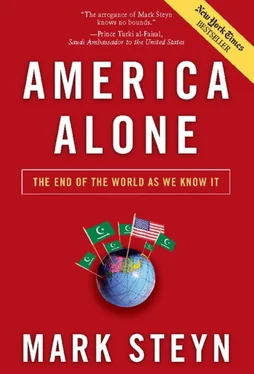You might say, as “open borders” advocates do, oh well, the American idea is so strong that all those 31 percent grade school Hispanics will be perfectly assimilated by the time they’re in high school. Maybe. To put it at its mildest, that requires taking a very optimistic view of the assimilationist power of contemporary multiculturalism. Now put yourself in Europe’s shoes, up against a surging demographic more self-segregating and more explicitly opposed to the Continent’s cultural and political inheritance. Will plus demography is a potent combination: it’s why you can’t dismiss Sheikh Omar Bakri Mohammed as a fringe nutcake — because he can command just enough support from just enough people to put just enough of what he wants just within the realm of political possibility. After September 11, the first reaction of just about every prominent Western leader was to visit a mosque: President Bush did, so did the Prince of Wales, the prime minister of the United Kingdom, the prime minister of Canada and many more. And, when the get-me-tothe-mosque-on-time fever died away, you couldn’t help feeling that this would strike almost any previous society as, well, bizarre. Pearl Harbor’s been attacked? Quick, order some sushi and get me into a matinee of Madam Butterfly! Seeking to reassure the co-religionists of those who attack you that you do not regard them all as the enemy is a worthy aim but a curious first priority. And, given that more than a few of the imams in those mosque photoops turned out to be at best equivocal on the matter of Islamic terrorism and at worst somewhat enthusiastic supporters of it, it involved way too much self-deception on our part. But it set the tone for all that followed, to the point where with each bomb or plot — from September 11 to London to Toronto — the protestations of Islam’s good faith grew ever more fulsome. “Minority rights doctrine,” wrote British author Melanie Phillips, “has produced a moral inversion, in which those doing wrong are excused if they belong to a ‘victim’ group, while those at the receiving end of their behavior are blamed simply because they belong to the ‘oppressive’ majority…. It is impossible to overstate the importance — not just to Britain but to the global struggle against Islamist extremism — of properly understanding and publicly challenging this moral, intellectual, and philosophical inversion, which translates aggressor into victim and vice versa.”
Consider the name given to the current conflict: “war on terror.” Wait a minute. Aren’t wars usually waged against named enemies? Yes, but, to the progressive mind, the very concept of “the enemy” is obsolescent: there are no enemies, just friends whose grievances we haven’t yet accommodated. In part, it’s societal forgetfulness. In an electronic age, a present-tense culture, we assume that social progress is like technological progress: it can’t be reversed. Just as you can’t disinvent the internal combustion engine, so you can’t disinvent women’s rights. Just as the horse and buggy yielded to the steam train and the Ford Model T and the passenger jet, so the advanced social-democratic society will march onward to state day care and thirty-hour work weeks and gay marriage and ever greater ethnic diversity — and nothing can turn it back, certainly not a lot of seventh-century weird beards. Many of us figure the Islamist plan to re-establish the caliphate is the equivalent of that moment in The SpongeBob SquarePants Movie when Plankton roars, “I’m going to rule the world!” Towering over him, SpongeBob says, “Good luck with that.” But you never know: it might be that we’re the plankton. “Our enemies are small worms,” Adolf Hitler told his generals in August 1939. “I saw them at Munich.” In Europe today, as in the thirties, the political class prostrates itself before an insatiable force that barely acknowledges the latest surrender before moving on to the next invented grievance. Indeed, a formal enemy is all but superfluous to requirements. Bomb us, and we agonize over the “root causes.” Decapitate us, and our politicians rush to the nearest mosque to declare that Islam is a religion of peace.” Issue blood-curdling calls at Friday prayers to kill all the Jews and infidels, and we fret that it may cause a backlash against Muslims. Behead sodomites and mutilate female genitalia, and gay groups and feminist groups can’t wait to march alongside you denouncing Bush and Blair. Murder a schoolful of children, and our scholars explain that to the “vast majority” of Muslims “jihad” is a harmless concept meaning “healthy-lifestyle lo-fat granola bar.” Thus the lopsided valse macabre of our times: the more the Islamists step on our toes, the more we waltz them gaily round the room. As French philosopher Jean-François Revel wrote, “Clearly, a civilization that feels guilty for everything it is and does will lack the energy and conviction to defend itself.” During the cartoon jihad, the New York Times gave a routinely pompous explanation of why it would not be showing us the representations of the Prophet: sensitive news organizations, the editors explained, had the duty to “refrain from gratuitous assaults on religious symbols.” The very next day the Times illustrated a story on the Danish controversy with a piece of New York “art” from a couple of seasons earlier showing the Virgin Mary covered in elephant dung. Multiculturalism seems to operate on the same even-handedness as the old Cold War joke in which the American tells the Soviet guy that “in my country everyone is free to criticize the president,” and the Soviet guy replies, “Same here. In my country everyone is free to criticize your president.” Under the rules as understood by the New York Times, the West is free to mock and belittle its Judeo-Christian inheritance, and, likewise, the Muslim world is free to mock and belittle the West’s Judeo-Christian inheritance. If one has to choose, on balance Islam’s loathing of other cultures seems psychologically less damaging than the Western elites’ loathing of their own.
Insurgencies, whether explicitly terrorist or more subtle, persist because of a lack of confidence on the part of their targets. The IRA, for example, calculated correctly that the British had the capability to smash them totally but not the will. So they knew that while they could never win militarily, they also could never be defeated. The Islamists have figured similarly. The only difference is that most terrorist wars are highly localized. We now have the first truly global terrorist insurgency because the Islamists view the whole world the way the IRA view the bogs of Fermanagh: they want it, and they’ve calculated that our entire civilization lacks the will to see them off.
Granted, at a certain level that’s preposterous. There’s a contradiction at the heart of Islamist confidence, nicely caught in a story from New Zealand about female Muslims driving around in burqas. According to some police representatives, this mode of dress somewhat restricts the field of vision, and also offers opportunities for fleeing bank robbers to disguise themselves as Muslim women. However, nobody wants to be insensitive, do they? And, on the whole, the police were happy to take the Islamic lobby groups at their word that the burqa was a requirement of these women’s faith. But as Greg O’Connor, president of the New Zealand Police Association, couldn’t resist adding, “If one’s belief system was so strong that you didn’t want to show one’s face then perhaps that belief system should extend to not driving.”
Indeed. If your clothing can’t evolve out of the camel-train era, maybe your mode of transportation shouldn’t either. But that’s Islam in the third millennium: they want the certainties of seventh-century society with the conveniences of the twenty-first century. It doesn’t work like that, of course. An Islamic States of America, an Islamic Republic of France, an Islamic Kingdom of Belgium, an Islamic Dominion of Canada would all very quickly be societies in decline, living on the accumulated capital of their pre-Muslim past — as, indeed, much of Islam did at its zenith. But do we really want to test that proposition?
Читать дальше












